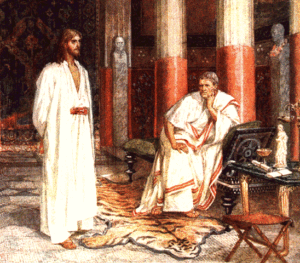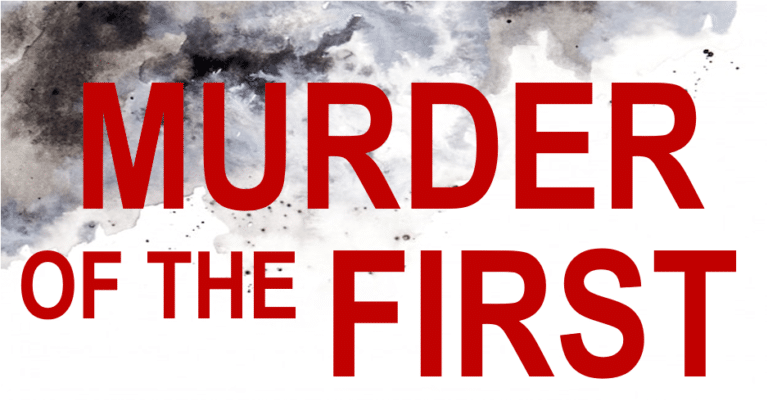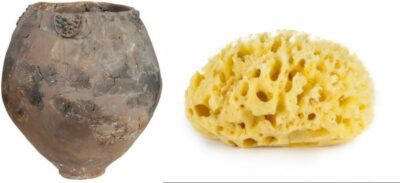Many verses in the Bible, at one time or another, have been labeled as profound. And rightfully so. There are also many obscure verses. However, much of scripture, especially the New Testament, is very literal in its meaning. But, some verses of scripture are both obvious and obscure, indicating their spiritual depth. We should take them literally with the understanding that there is more here than seen at first glance.
Oddly enough, the Bible’s most prominent and obscure statements are brief. “In the beginning, God created the heavens and the earth,” “Jesus wept,” and “It is finished” are just a few examples. One of these types of statements, posed as a question uttered by a non-believer at a critical moment in history, will be where we begin our journey. “Pilate said to Him, what is truth?” 1
Imagine standing before the Lord Jesus and asking such a question. Pilate was no ordinary man, and this was no ordinary moment in time. Pontius Pilate, the procurator over the Judean Provence, was not ignorant that he held the power of life and death. Now, he finds himself in a pivotal moment, thinking this was merely a political trial—another obvious situation for a procurator to deal with. But standing before truth incarnate, he would soon realize this profound moment.
There is no reason to think Pilate made this statement flippantly and every reason to believe he made it with the utmost sincerity. The truth, in Pilate’s world, was never absolute, having presided over untold numbers of situations where plaintiffs proclaiming the truth of their innocence.
A kind of truth contrived in desperation to save oneself from death. In an attempt to make their truth more believable, an ‘I swear’ is often at the end of their claim of innocence. Yet this doesn’t make the statement any more credible. We see this kind of thing today. In casual conversation, we see people telling a story and then adding the suffix, ‘it’s the truth,’ or ‘I swear it’s the truth. ‘
Pilate had certainly faced this type of truth throughout his career in service to Rome. The truth was ever-changing depending on who said it, where it was, or in what context. It was a pliable truth, a truth that could be bent or twisted to fit the need. In Pilate’s political world, the truth was anything but the truth. In the world of politics, truth is what is believed by the masses.
Pilates question posed was “The question of a worldly politician: skeptical, because he was indifferent: one who thought truth an empty name, or at least could not see any connection between truth and policy.” 2
Similarly, it is the kind of truth presented in the courtroom—a venue where truth was either partial or became secondary in importance. Drama, theatrics, and the assertion of facts heralded as truth were and are today the leading players. Prosecuting and defending attorneys battle to convince a jury of their version of the truth. Is it the pursuit of truth or victory?
In today’s courtrooms, witnesses have to swear or affirm that they will tell the whole truth and nothing but the truth. But they are never allowed to testify about the ‘whole truth’ because they probably don’t know it. Being allowed only to reveal parts of the truth, presented with questions carefully tailored to disclose specific facts the attorneys wish to use in constructing what they want the jury to believe is true.
The winners of these courtroom dramas often claim victory with the statement, ‘Justice was served today.’ But justice is based on what? The truth as you presented it? More often than not, we see the outcome of justice served based on anything but the ‘whole truth,’ and often, truth plays no part in the trial’s outcome. How can there be justice in the absence of the whole truth? Justice would find no part in this meeting between Pilate, Jesus, and His accusers.
Truth becomes subjective to those who use it to their benefit. It can be subjective to those who want something to be accurate, even if it isn’t. Against the backdrop of these past experiences, Pilate would pose the question, “What is truth?” Like so many others, Pilate understands what truth is or what it is supposed to be but perhaps has never come face to face with the truth in its singular and purest form. That is until this meeting with Jesus.
Until one faces absolute truth, there is no accurate way to confirm or deny what is truth. The world is all too willing to accept facts as truth when facts in themselves are not truth. Facts are bits of information that should lead us to the truth. Facts alone may be true, and most times are, but they are not truth. You see, lies can be factual. If you tell a lie and others know it’s a lie, then it’s a fact you told a lie.
Placing facts above truth is commonplace in the world today. One can assemble a selected group of points and arrange them in such a way, piecing together a scenario that makes logical sense but doesn’t make the conclusions accurate. Today, most truth is superficial. Seemingly genuine, but that’s not what absolute truth is.
The subjective selection of facts is how specific scientific theories become accepted as accurate conclusions. And once a scientific community converts a thesis into scientific fact, it becomes the accepted truth. Any newly discovered facts contradicting the concluded theories are demonized or rejected outright. Evolution is a perfect example of this.
Science is more than a discipline; it is an art. It is man’s quest to discover all he can and, with each discovery, bring man closer to God. Sadly, much of today’s academia uses science to try to disprove the existence of God and accept random chance as the truth of creation.
More and more evidence is coming to light, challenging evolutionary theory every year. Yet, recent discoveries are not accepted with the same validity as previous ones, leaving us where truth becomes subjective. Subjective to the beliefs of those who have elevated evolutionary theory to absolute fact. Reminiscent of Paul’s writing to Timothy, “always learning and never able to come to the knowledge of the truth.” 3
Truth is not a feeling or an intuition, yet many use these experiences to prove the truth. I feel it’s true, or I sense it’s true; it might be real experiences, yet it’s still subjective truth. Truth supported or born witness to by feelings.
Worse still is the acceptance of preconceived truth. People are quick to believe almost anything as accurate without considering any facts. You only need to surf any social media platform and see people vilified by an accusation. Accusations are not valid unless proven to be so. So why are people so willing to accept them as truth? How is this accomplished? Those who live a lie are quick to accept a lie.
In his book Disinformation, Whittaker Chambers writes about the KGB’s success in deceiving people using this simple yet demonically clever tactic. “Every story that is to be used as propaganda must have a kernel of truth, so it’s believable.” Whittaker Chambers was a successful Communist operative in the U.S. For years. He eventually came to know God through the revelation of Jesus. Whittaker Chambers met the truth through Christ and recognized the reality of what he was doing, thereby exposing the evils of communism. Eventually, Whittaker Chambers’s testimony would lead to the conviction of Alger Hess, the notorious communist spy who had successfully infiltrated the highest levels of the U.S. government and the United Nations for years.
So here we are, with the Son of God standing before a man who has witnessed firsthand the distortion of truth throughout his career, asking the question, ‘What is truth.’ It must have been a shock to Pilate to be confronted by a man who did not deny the charge against Him. Perhaps Pilate expected Jesus to act like everyone else on trial and deny or lie about the accusations to save Himself from crucifixion.
Pilate first asks, “Therefore Pilate said to Him, “So You are a king?” It was at this point Pilate expected any answer except the truth. Instead of a self-saving lie, “Jesus answered, “You say correctly that I am a king. For this, I have been born, and for this, I have come into the world to testify to the truth. Everyone who is of the truth hears My voice.”
It is then Pilate inquires, “What is truth?” How quickly truth became evident to Pilate, for he recoils and tries to remove himself from the reality of facing the truth and desperately seeks a way out.
Pilate is now in the company of divine truth, a truth that transcends the physical realm and bridges to the spiritual, creating a sharp and distinct division between real and contrived reality. The truth lays bare the thoughts and intents of the heart—the kind of truth Pilate had never encountered. Without a word spoken, Pilate has received the answer to his question.
“And when he had said this, he went out again to the Jews and said to them, I find no guilt in Him.” A fantastic choice of words, “I find no guilt in Him.” Of course not. Jesus was not guilty of the fictitious charges brought by the Sanhedrin. He was guilty of nothing.
Pontius Pilate was not a spinless bureaucrat, as some may suppose. The Historian Philo recalls Pilate’s encounter with Jesus and his concerns about the possibility of the Jewish revolt, “But this last sentence exasperated him in the greatest possible degree, as he feared least they might in reality go on an embassy to the emperor, and might impeach him with respect to other particulars of his government, in respect of his corruption, and his acts of insolence, and his rapine, and his habit of insulting people, and his cruelty, and his continual murders of people untried and uncondemned, and his never ending, and gratuitous, and most grievous inhumanity.” 4
Pilate could have sought to buy time and delayed his decision regarding Jesus. He could have studied the matter on his own, compiling and arranging facts to try and determine if what Jesus was saying was, in fact, true. He could have consulted with others, collected opinions, and acted on a consensus. But there was no need; he knew it was true.
The gospel of Mathew tells us that this very day, Pilate’s wife warns him not to have anything to do with condemning Jesus. Because of a dream, she regarded Jesus the previous night. “While he was sitting on the judgment seat, his wife sent him a message, saying, Have nothing to do with that righteous Man; for last night I suffered greatly in a dream because of Him.” 5
It is inconceivable that Pilate learned of Jesus after this meeting. Jesus’s notoriety among his followers and the crowds drawn to Him would have garnered the attention of the procurator of Judea. There is even a distinct possibility he may have summoned and spoken to Jesus in person. Some early writings attest to this fact but are considered apocryphal, placing their validity in question. Whether Pilate and Jesus had a personal meeting before this public trial doesn’t dismiss Pilate’s knowing who Jesus was.
Jesus spoke the truth; He bore witness to the truth. This undeniable reality stands in Pilate’s presence, the Son of God. When caught in the middle of a situation, realizing he is no longer in control of it, Pilate seeks to free Jesus but reluctantly passes a sentence. Pilate, no doubt, understood the words of Jesus, which bore out another truth, “You would have no authority over Me at all, if it had not been given to you from above; for this reason, the one who handed Me over to you has the greater sin.” 6
At this point in the scene, Pilate, perhaps in spite of or witness to the truth, attempts to wash his hands of the matter. Pilate’s washing of hands is an act directly from Old Testament law concerning the inability to identify one guilty of killing an individual. “All the elders of that city which is nearest to the slain man shall wash their hands over the heifer whose neck was broken in the valley; and they shall answer and say, Our hands did not shed this blood, nor did our eyes see it.” 7
This hand washing would not, nor could not, remove the guilt. Pilate finds himself in unfamiliar territory, no longer controlling the situation. Jesus’s mission would proceed, and Pilate could do nothing about it. He was no longer a director but a cast member. His part in the sacrifice of the Son of God on the cross was over, like others before, since he was guilty of facing and rejecting the truth. Pilate disappears from the pages of scripture from this point, but history has left us some information about his later life.
Three years after the crucifixion of Jesus (approximately 36 AD), Pilate’s cruelty and disgust with Jewish revolts climaxed. A rumor spread that Moses had buried the ark of the covenant and other ancient relics in a cave at Mt. Gerizim (which is in Samaria, close to Shechem). During the excavations, excitement is mistaken as a riot among the Jews. Pilate dispatched a cohort of soldiers to quell the supposed uprising, which resulted in the massacre of innocent people by the Roman garrison.
The Jews complained to the regional governor, resulting in Pilate’s removal from office, and He was sent to Rome to answer to Tiberius Caesar for his actions. By the time Pilate arrived in Rome, Tiberius Caesar was dead, and Caligula sat on the throne. Think about it -Pilate used to presiding over trials, would now be a defendant in one, answering to another who held life and death in their hands. We have no record of what occurred at Plate’s defense before the new Caesar, or even if there was one, but after this, Pilate was ‘retired’ to a small village north of Rome.
Several sources agree with Eusebius’s account of Pilate’s final fate, “wearied with misfortunes, killed himself. ” 8 Pilate’s fate, if accurate, seems to be the same as another one who encountered truth incarnate and killed himself upon his rejection, Judas Iscariot. Judas sold out the Christ for thirty pieces of silver. Pilate trades the Son of God for a criminal. When you think about it, if you come face to face with the truth, discard it, or participate in its destruction, are you not committing spiritual suicide?
Then, some read obvious scripture verses and deny their literal meaning, distorting them to mean something obscure and simply denying their truth. Truth is simple. Only our fear of it makes it so.
What is truth? Many things in the world are true but do not constitute the truth. The truth is humanity is separated from God because of sin. And Jesus came to bear witness to this truth. It is testified to by the very life He lived during His earthly ministry, a sinless life, testifying that we are all sinners and need salvation.
To deny this fact is suicide. Rejection of truth is guilt by self-condemnation. We have sentenced ourselves to death. Death is eternal separation from God. What is truth? And what will you do now that you know?
1 John 18:38a
2 Gesta Pilati (Pontius Pilate) William O Clough pg. 31
3 II Timothy 3:7
4 Philo book 40 pg.302
5 Mathew 27:19
6 John 19:11
7 Duet. 21:6-7
8 Eusebius The History of the Church Chapter 7










+ There are no comments
Add yours